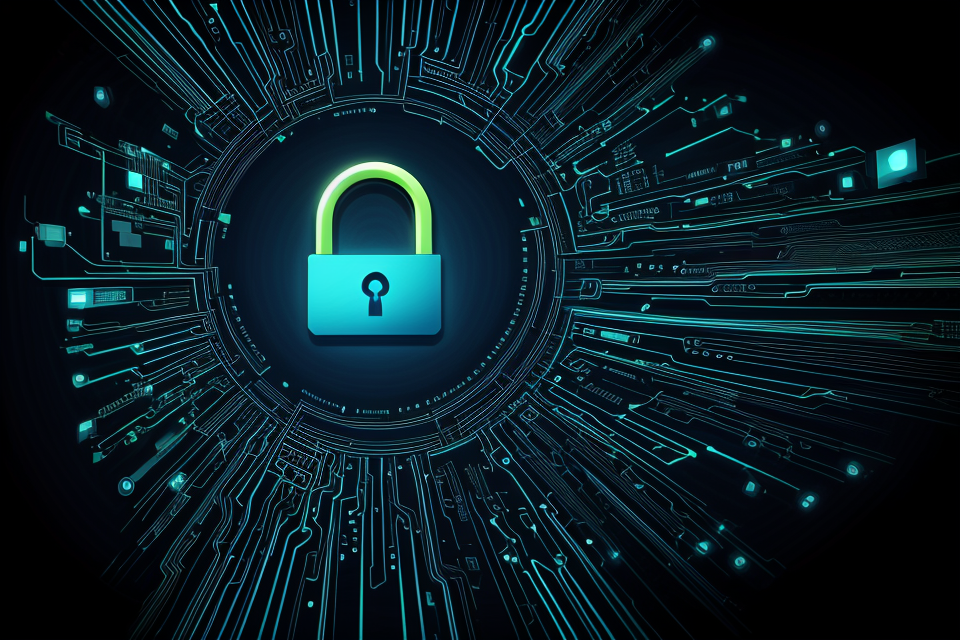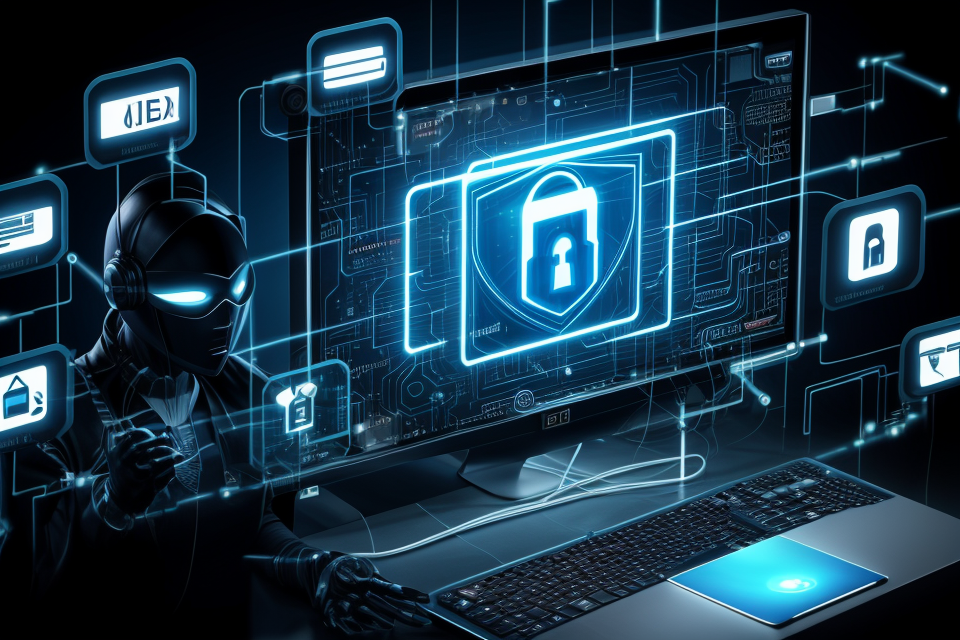Cyber security is the practice of protecting computers, servers, mobile devices, electronic systems, networks, and data from theft, damage, or unauthorized access. In today’s digital age, where we rely heavily on technology, cyber security has become a critical concern for individuals, businesses, and governments alike. Cyber attacks are becoming increasingly sophisticated, and with the rise of cybercrime, it’s essential to understand the importance of cyber security and how to protect ourselves and our data. This article will provide a comprehensive overview of cyber security, its importance, and some simple steps we can take to safeguard our digital assets.
Cybersecurity refers to the protection of internet-connected systems, including hardware, software, and data, from attack, damage, or unauthorized access. It is important because cyberattacks are becoming increasingly common and sophisticated, and can result in significant financial and reputational damage to individuals and organizations. Cybersecurity measures can include firewalls, antivirus software, encryption, and secure passwords, among others. By implementing effective cybersecurity practices, individuals and organizations can protect themselves from cyber threats and ensure the confidentiality, integrity, and availability of their data and systems.
What is Cyber Security?
Definition of Cyber Security
Cyber security refers to the protection of internet-connected systems, including hardware, software, and data, from attack, damage, or unauthorized access. It involves a range of measures and technologies designed to safeguard computer systems, networks, and sensitive information from cyber threats. Cyber security is an essential aspect of modern-day computing, as more and more businesses and individuals rely on the internet for their daily operations and personal information storage.
Cyber Security Components
Cyber security comprises several key components that work together to provide comprehensive protection against cyber threats. These components include:
- Confidentiality: This refers to the protection of sensitive information from unauthorized access, disclosure, or theft. Confidentiality is essential in ensuring that only authorized individuals can access sensitive data, such as financial information or personal identifiable information (PII).
- Integrity: Integrity is the assurance that data is not tampered with or altered without authorization. It involves ensuring that the data is accurate, complete, and trustworthy. This is important in maintaining the credibility and reliability of the data, as well as preventing unauthorized changes to critical information.
- Availability: Availability refers to the guarantee that critical systems and information are accessible to authorized users when needed. It involves ensuring that the systems are functioning properly and that the information is accessible to authorized users without any interference from cyber attackers.
- Authentication: Authentication is the process of verifying the identity of users or systems accessing a particular resource. It involves ensuring that only authorized individuals or systems can access sensitive information or critical systems.
- Authorization: Authorization is the process of granting specific access rights to authorized users or systems. It involves ensuring that only authorized individuals or systems can access sensitive information or critical systems and perform specific actions within those systems.
Why is Cyber Security Important?
Cyber Security Risks
- Cyber attacks: These are malicious attempts to breach the security of a computer system or network. They can take many forms, including malware, phishing, and ransomware attacks.
- Data breaches: A data breach occurs when sensitive information is accessed or stolen by unauthorized individuals. This can include personal information, financial data, and confidential business information.
- Identity theft: Identity theft occurs when someone uses another person’s personal information, such as their name, Social Security number, or credit card information, to commit fraud or other crimes.
- Financial loss: Cyber security breaches can result in financial losses for individuals and businesses, including the cost of restoring systems and data, paying ransoms, and reimbursing customers for stolen funds.
Consequences of Cyber Security Breaches
- Loss of sensitive information: Cyber security breaches can result in the loss of sensitive information, such as financial data, trade secrets, and personal information. This can have serious consequences for individuals and businesses, including financial losses and damage to reputation.
- Damage to reputation: A cyber security breach can damage a company’s reputation, leading to a loss of customer trust and financial losses.
- Legal liabilities: Companies that experience a cyber security breach may face legal liabilities, including fines and lawsuits, if they are found to be in violation of data protection laws.
- Financial losses: Cyber security breaches can result in significant financial losses for individuals and businesses, including the cost of restoring systems and data, paying ransoms, and reimbursing customers for stolen funds.
Cyber Security Measures
Best Practices for Cyber Security
- Use strong passwords: It is essential to use strong passwords that are difficult to guess. Avoid using weak passwords such as “password” or “123456.” Instead, use a combination of letters, numbers, and special characters. It is also recommended to use a different password for each account to minimize the risk of unauthorized access.
- Keep software up-to-date: Keeping software up-to-date is critical to maintaining cyber security. Software updates often include security patches that address vulnerabilities that could be exploited by hackers. Therefore, it is crucial to install updates as soon as they become available.
- Use anti-virus software: Anti-virus software is designed to detect and remove malware from your computer. It is essential to have anti-virus software installed on your computer and to keep it up-to-date to ensure that it can detect the latest threats.
- Be cautious when using public Wi-Fi: Public Wi-Fi networks are often unsecured, which means that they are vulnerable to hacking. Therefore, it is essential to be cautious when using public Wi-Fi networks. Avoid accessing sensitive information such as bank accounts or email when using public Wi-Fi.
- Be aware of phishing scams: Phishing scams are designed to trick people into providing personal information such as passwords or credit card numbers. It is essential to be aware of these scams and to never provide personal information in response to unsolicited emails or messages.
Technical Measures for Cyber Security
- Firewalls: Firewalls are designed to monitor and control incoming and outgoing network traffic. They can be used to block unauthorized access to a network and to prevent malware from spreading.
- Encryption: Encryption is the process of converting plaintext into ciphertext to prevent unauthorized access to information. It is essential to use encryption to protect sensitive information such as financial data or personal information.
- Intrusion detection and prevention systems: Intrusion detection and prevention systems are designed to detect and prevent unauthorized access to a network. They can be used to identify and block malicious traffic and to alert network administrators to potential security threats.
- Virtual private networks (VPNs): VPNs are designed to create a secure connection between a computer and a network. They can be used to protect sensitive information when accessing public Wi-Fi networks or to bypass internet censorship.
The Future of Cyber Security
As technology continues to advance, so do the methods of cyber attacks. The future of cyber security is shaped by emerging threats and challenges that need to be addressed.
Emerging Threats
Ransomware attacks have become increasingly sophisticated, with attackers using advanced encryption methods to lock victims out of their own data. The rise of IoT devices has also led to a new type of attack, where hackers target vulnerable IoT devices to launch large-scale attacks. Additionally, AI-based attacks are becoming more prevalent, with attackers using machine learning algorithms to improve their ability to evade detection.
Cyber Security Challenges
One of the biggest challenges facing cyber security professionals is the shortage of skilled workers. With a growing number of cyber security jobs and a limited pool of qualified candidates, companies are struggling to find the talent they need to protect their networks. Additionally, new cyber regulations and compliance requirements are constantly being introduced, making it difficult for companies to keep up with the latest standards. Finally, the rapidly evolving nature of technology means that cyber security professionals must continuously adapt to new threats and stay up-to-date with the latest tools and techniques.
FAQs
1. What is cyber security?
Cyber security refers to the protection of internet-connected systems, including hardware, software, and data, from theft, damage, or unauthorized access. It involves the use of various technologies, policies, and practices to prevent cyber attacks and ensure the confidentiality, integrity, and availability of digital assets.
2. Why is cyber security important?
Cyber security is important because the internet has become an integral part of our daily lives, and we rely on it for a wide range of activities such as banking, shopping, and communication. With the increasing reliance on technology, the risk of cyber attacks has also increased, and cyber criminals are constantly finding new ways to exploit vulnerabilities in systems. Cyber security helps protect against these threats and ensures that our digital assets are secure.
3. What are some common types of cyber attacks?
Some common types of cyber attacks include malware attacks, phishing attacks, ransomware attacks, denial of service attacks, and social engineering attacks. Cyber criminals use various tactics to gain unauthorized access to systems, steal sensitive information, or disrupt services.
4. How can I protect myself from cyber attacks?
There are several steps you can take to protect yourself from cyber attacks, including using strong passwords, keeping your software up to date, using antivirus software, being cautious when clicking on links or opening attachments, and being aware of phishing scams. It’s also important to be mindful of the security settings on your devices and to be cautious when using public Wi-Fi.
5. What is the role of cyber security in business?
Cyber security plays a critical role in business, as companies rely on technology to store and process sensitive information such as customer data, financial records, and intellectual property. Cyber security helps protect against data breaches, cyber attacks, and other threats that could result in financial losses, reputational damage, and legal liabilities. Companies need to implement robust cyber security measures to protect their digital assets and comply with legal and regulatory requirements.



